An Incredible Journey from “Hell” to “Heaven”
There is a saying going among hikers and outdoor enthusiasts - “If you don’t go to paradise, then go to Yubeng.” Yubeng Village, about 38 kilometers away from Meili Snow Mountain, is a secret and mysterious Tibetan Village hidden on the pure land at the foot of Meili Snow Mountain. This 7 days Shangri-La tour belongs to the in-depth exploration about all highlights in the earthly paradise with extension to Meili Snow Mountain for golden sunrise and unbelievable trekking trips to Yubeng Village. It takes about 3 to 4 days trekking into, around, out this holy village. The trekking will be tough with some challenges of your body, BUT, it will reward you breathtaking scenery, making you traveling in heaven. It will surely be the journey from “hell” to “heaven”! Dare to try?
Best Time to Do the Trip: To guarantee your safety and comfortable experience, it is suggested to come in spring (April to June) and autumn time (September to November). During these periods, the road will be in good condition and you’ll be more likely to watch the golden sunrise.
Welcome to Shangri-La (Zhongdian, altitude: 3459 meters), the Garden of Eden! Upon arrival, you’ll be greeted by our local guide at the arrival hall of the airport who is holding a sign which says your name. Then the guide and driver will transfer you directly to your hotel in Shangri-La by our comfortable private car (non-smoking), and the guide will help you with the check-in procedure. The rest of the day is on your own to discover this earthly paradise.
Arrival Ideas: At present, Diqing Shangri-La Airport has direct flights from/to Kunming, Chengdu, Lhasa, Guangzhou, Chongqing, etc. It is about 6 kilometers (15mins’ transfer) to old town of Shangri-La.
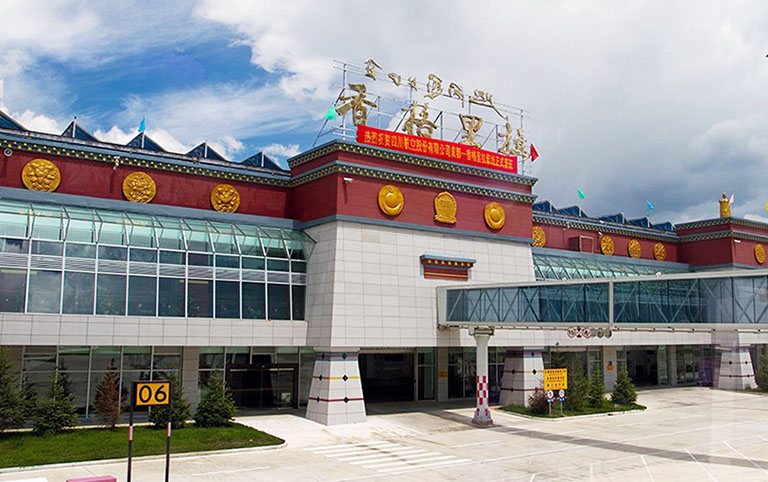 Diqing Shangri-La Airport
Diqing Shangri-La Airport
After breakfast, your guide and driver will pick you up at your hotel. First, you’ll be transferred with 7 kilometers’ driving to Songzanlin Monastery (Ganden Sumtseling Gompa), reputed as the “Little Potala Palace” for it was built according to the complex of Potala Palace in Lhasa, Tibet. Established by the Fifth Dalai Lama in 1679, the monastery belongs to Gelug Sect of Tibetan Buddhism, and it is also the largest Buddhist monastery in Yunnan Province with around 700 monks and lamas. Walk 147 steps to get atop of the monastery and pay clockwise visit to the three main lamasery buildings where you can not only see the Buddhism treasures, but also enjoy large number of monks of all ages going about their daily routines, praying, chanting, cooking and resting. It should a nice trip to get in-depth understanding about Tibetan Buddhism. If time permits, take some quiet time to walk around the peaceful Lamuyangcuo Lake and shoot panorama view of Songzanlin Monastery with reflection in the clear water.
Then, drive about 27 kilometers to Pudacuo National Park. This 1,300-square-kilometer national park is notable as the first national park in China to meet International Union for Conservation of Nature standards. It is renowned for well-preserved primitive landscape, which is endowed with lakes, wetlands, forests, meadows, streams, brooks, rare plants and animals. Visit the spots by clockwise and throw yourselves into the lush green forest with diverse species of flora and fauna, walk along the plank road to catch the gorgeous scenery of Shudu Lake (hike 3.3 km, about 1 hour). (Note: the altitude of Pudacuo is at 3500m-4150m and you should avoid strong activities. There's no problem to hike in the park.) Walk along the wooden plank road (1 kilometer for single route, about 50 minutes for a round route) to admire the satisfying alpine meadow with seasonal blossoms and immerse into the verdant scenery of the peaceful Bita Lake (altitude: 3538 meters) which has the highest altitude among lakes in Yunnan and is praised as the “pearl of the plateau”.
Important Notice: Militang Pasture (弥里塘草场) in Pudacuo National Park is closed for tourists due to maintenance from 3th September, 2017. The administrative office of Pudacuo National Park hasn't confirmed when they will be open exactly. Shudu Lake Scenic Area (属都湖) and Bita Lake Scenic Area (碧塔海) are open for tourists. If you want to adjust today’s itinerary, please contact your travel consultant.
After the merry time in the park, pay a visit to a local Tibetan family to experience the highly-praised hospitality of Tibetan people and taste some special Tibetan snacks and butter tea. (Optional Experience: If you are interested in the Tibetan people's daily drinks, you can follow the locals to involve in the process of making butter tea.)
Last, drive back to Dukezong Old Town for further exploration. With a history over 1300 years, Dukezong Old Town is the largest and the best preserved Tibetan community in China. Climb up to the top of Guishan Hill (or Tortoise Hill) to have a panoramic view of both the endless snow-capped mountains surrounded the pure land and the large scale of the old town with countless Tibetan dwellings. Join in the tourists to turn the largest Prayer Wheel in the world in clockwise direction.
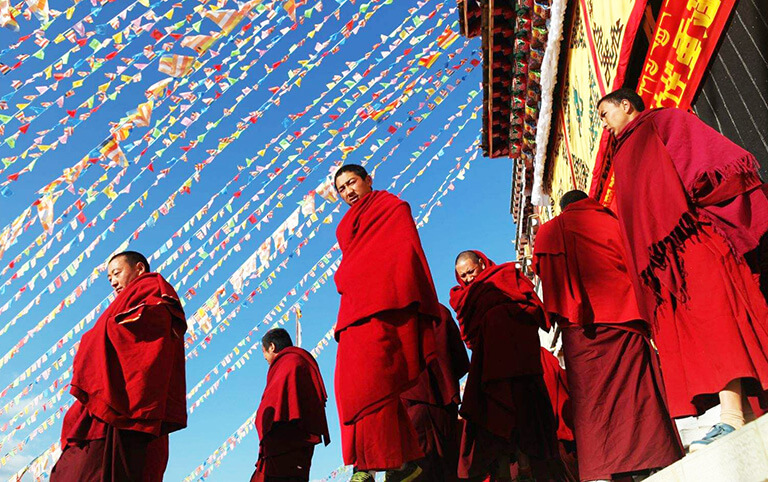 Songzanlin Monastery
Songzanlin Monastery
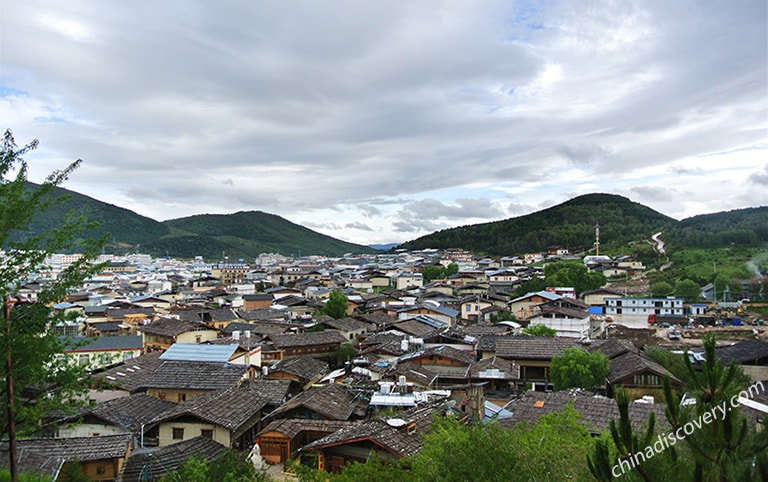 Dukezong Old Town
Dukezong Old Town
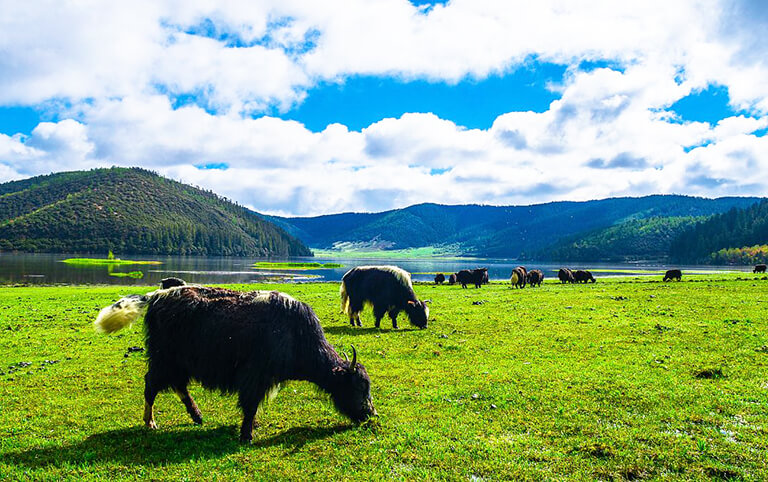 Pudacuo National Park
Pudacuo National Park
In the morning, you’ll be transferred to Deqin County from Shangri-La (about 174 kilometers). On the way, you’ll have a chance to visit the First Bend of Jinsha River. It is about 15 kilometers from Benzilan Town in Deqin, the border of Sichuan and Yunnan Province. Jinsha River is the upper reach of the Yangtze River, the longest river in China. Make a short visit and reach the observation platform to view the U shape turn with either emerald or yellow water flowing through the moon-shaped bend of Jinsha River. (Travel tip: Spring and Autumn are the best seasons to visit the Bend for the clear water. Summer is the rainy season of Yunnan Province and the color of the river is yellow during this period.)
Later, continue to visit Dongzhulin Monastery, one of the 13 great Lama monasteries in China. Built in 1667, Dongzhulin Monastery has its fame just after Songzanlin Monastery in Shangri-La. It has a legend that once upon a time, there was an eminent monk traveling here and he saw a pyramid-shaped mountain and regarded it as the embodiment of god. Hence the monastery was constructed. Visit its grand halls and view many precious cultural relics including gilded Maitreya Buddha, statue of master Tsongkhapa, Buddhas of Three Worlds, the ruler of the hell, Manjusri, 18 Arhats statues and Thangka scroll paintings depicting Buddhist stories. Also, you can have a look at other Buddhist stupas and religious instruments and props.
Afterwards, you’ll pass through Baima Snow Mountain and stop at its observation deck to catch the panorama of the 5430-meter snow-capped mountain.
With another 1 hour’s driving, you’ll finally arrive at Feilai Temple Scenic Area in Meili Snow Mountain. Check into your hotel there and take some rest. Meili Snow Mountain, known as Prince Snow Mountain, is one of the most sacred mountains of Tibetan Buddhism. There are 13 peaks standing magnificently on the ground with altitudes over 6,000 meters, hence being called Prince’s 13 Peaks. The highest Kawagebo peak is rising about 6740 meters, making Meili Snow Mountain the highest mountain in Yunnan. In the late afternoon, go to enjoy the beautiful sunset and see the 13 white Tibetan pagodas. Stay overnight near Feilaisi Observation Deck.
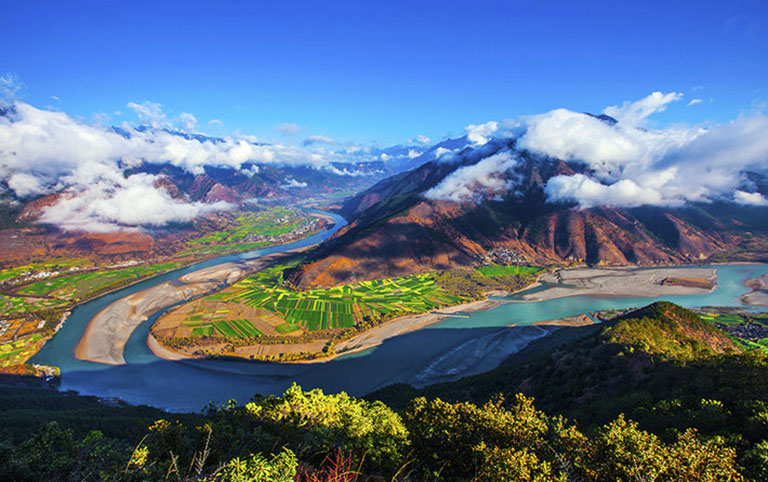 Magnificent First Bend of Yangtze River in Yunnan
Magnificent First Bend of Yangtze River in Yunnan
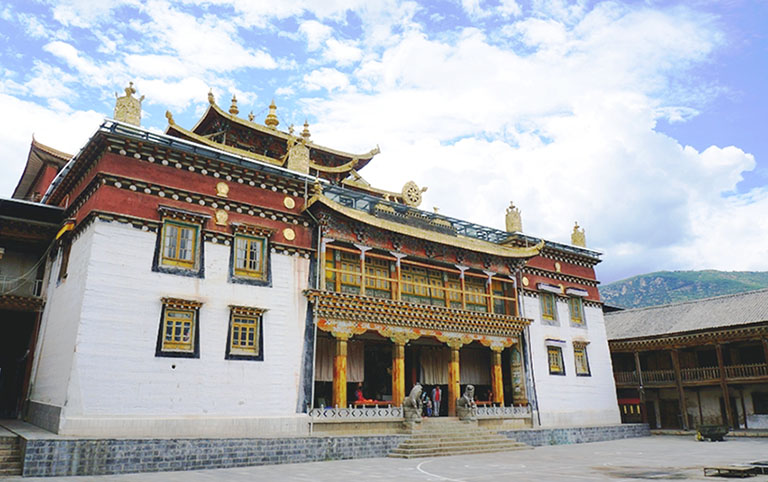 Dongzhulin Monastery
Dongzhulin Monastery
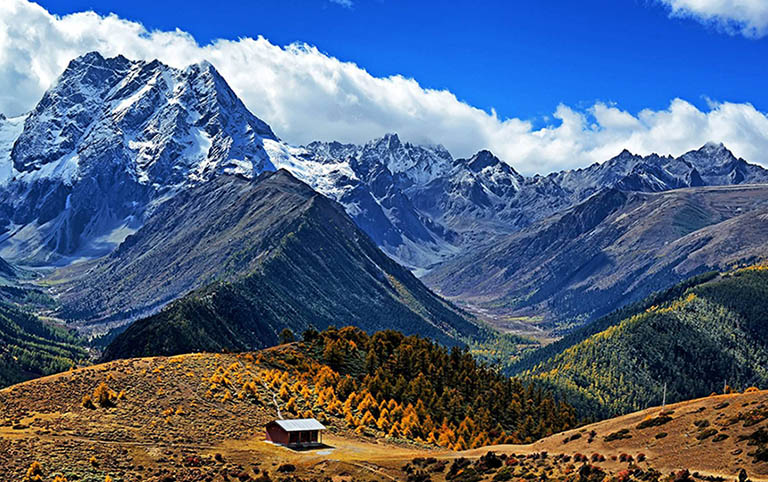 Baima Snow Mountain
Baima Snow Mountain
On this day, try to get up early and capture the incredible scene of golden sunrise shining upon its dramatic snow-capped peaks from Feilaisi Observation Deck (3,470 meters). (Sunrise time for reference: 06:40-07:40 in spring, 06:25-06:45 in summer, 07:00-07:30 in autumn, and 07:55-08:10 in winter.)
After the magic time, have your breakfast and start today’s hiking trip. First, drive about 1.5 hours from Feilai Temple to Xidang Spring (2,700 meters) to reach trail head. The following hiking is divided into two parts. The first one is from Xidang Spring to Nanzong Pass (3,729 meters) with a distance of about 6.1 kilometers which takes about 3-5 hours for hiking. During this section, the altitude will ascend about 1,000 meters which will be a little tough for you and you can recharge yourselves at three resting stops and have some snacks along the way.
The second part is from Nanzong Pass to Upper Yubeng Village (3,160 meters). The distance is about 3.3 kilometers with height descending about 600 meters. You’ll finish this route within 1-2 hours with easy hiking experience. Yubeng Village, a Land of Idyllic Beauty, is situated at the foot of the Niancimu Peak of Meili Snow Mountain with holy attractions scattered around. Regarded as the miniature of mysterious Shangri-La, Yubeng is divided into Upper Yubeng and Lower Yubeng. Today, you’ll stop at Upper Yubeng and have a good rest at the guesthouse there.
Important Notes for Hiking:
1) Average Temperature in Four Seasons: 6°C-20°C in spring, 15°C-26°C in summer, 10°C-23°C in autumn, and 0°C-12°C in winter. Try to come in spring and autumn season. 2) What to Bring: Since your hiking will last for several days, it is a good idea to make full preparation. You need to bring a hiking bag (30-40L), personal clothes, hiking shoes and socks, water, camera, some snacks, alpenstock, kneecap, gloves, small flashlight, sunscreen products, medicines, oxygen tanks, etc. 3) Road Condition: The trail belongs to earth road and sometimes will be muddy. To save your energy instead of hiking, you can rent a horse from Xidang Spring to finish the trail. Also, you can take the tourist SUV (need extra payment) from Xidang Spring to Upper Yubeng Village to shortcut your hiking trail. 4) Altitude Sickness: The hiking to climb the Nanzong Pass is steep, with height ascending about 1,000 meters to 3,729 meters that you should walk slowly to avoid high altitude sickness.
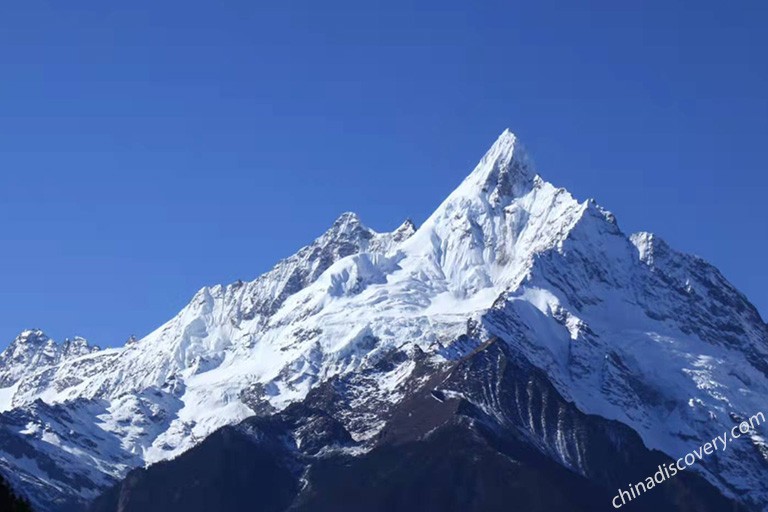 Meili Snow Mountain
Meili Snow Mountain
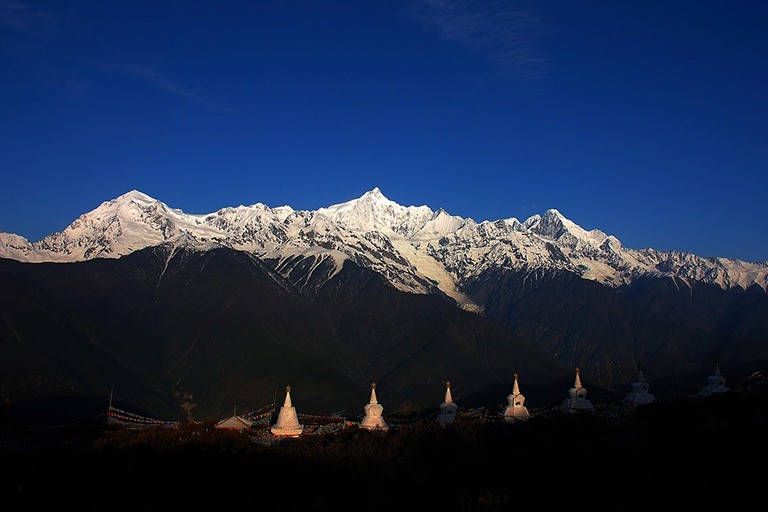 Feilaisi Observation Deck
Feilaisi Observation Deck
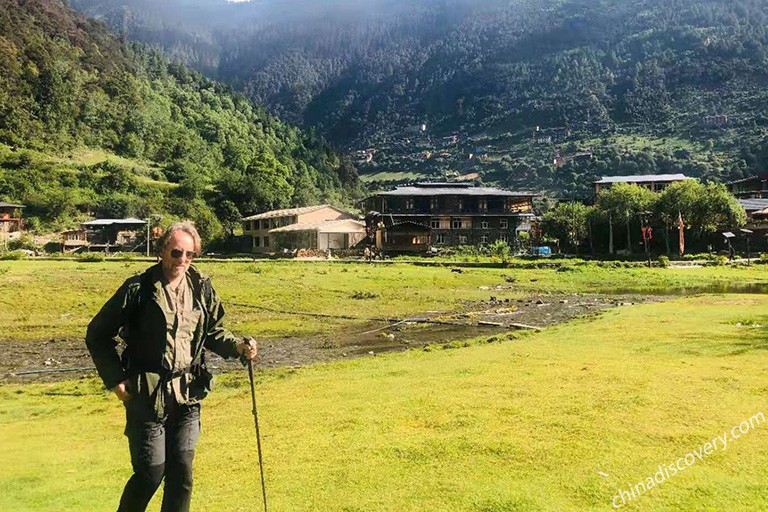 Upper Yubeng
Upper Yubeng
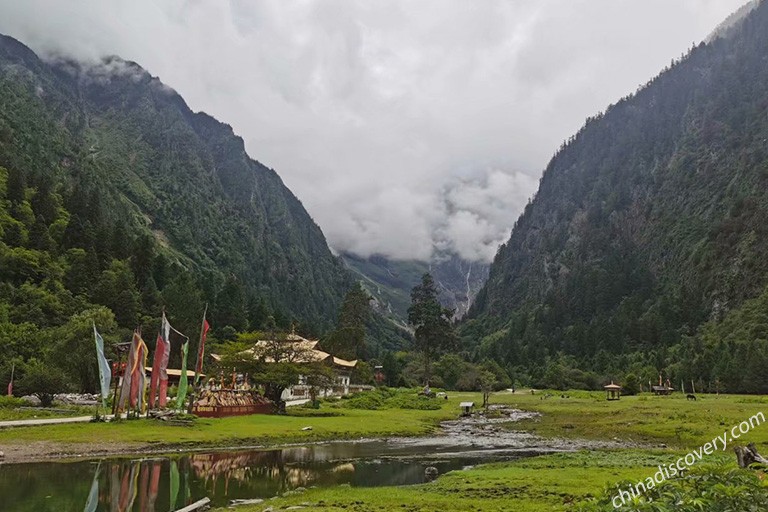 Yubeng Hiking
Yubeng Hiking
After having a simple breakfast, start today’s exciting hiking to Ice Lake, which is divided into three parts. The first part is from Upper Yubeng to Xiaonong Base Camp (3,623 meters), which is about 3.7 kilometers long, taking about 1.5-2.5 hours. You’ll stroll through a forested valley and along the river draining from the glaciers in the mountains above. This part is relaxing. The second part is from Xiaonong Base Camp to Ice Lake (3,900 meters) for 2.3 kilometers which needs about 1-2 hours.
Ice Lake, the holy lake of Meili Snow Mountain, is an emerald green lake formed by snow water from Meili Snow Mountain. It is the main water resource of Yubeng Village. One side of the lake is the mountain ridge and the other side is the vertical cliff and dangling huge glacier. A startling interplay of blue sky and white mountain makes the Ice Lake more like a paradise. Spend some time resting by the lake and appreciate the holy surrounding scenery.
After some rest, it is time to trek back to Upper Yubeng and spend another 30-40 minutes hiking from Upper Yubeng to Lower Yubeng (3,090 meters). It is about 1.6 kilometers in between with complex road. Upon arrival at Lower Yubeng Village, take a good rest at your guesthouse there.
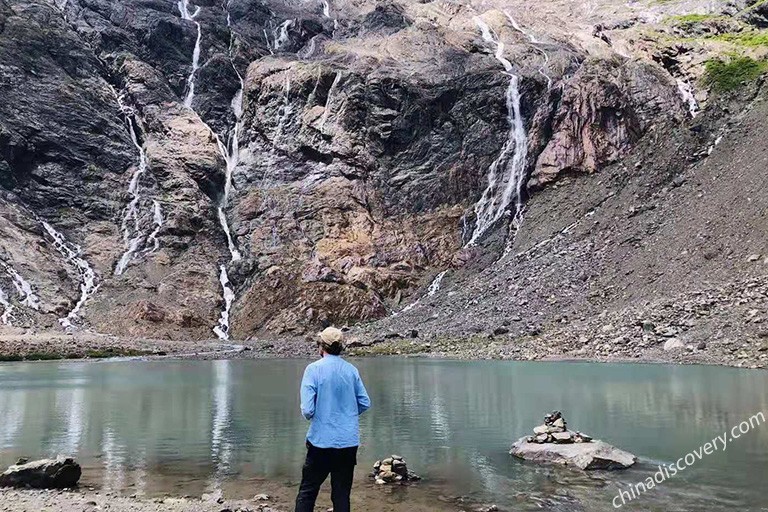 Ice Lake
Ice Lake
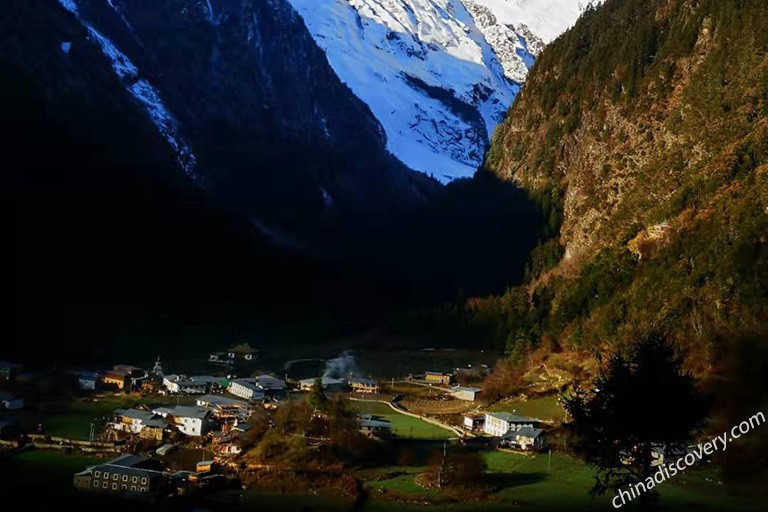 Lower Yubeng
Lower Yubeng
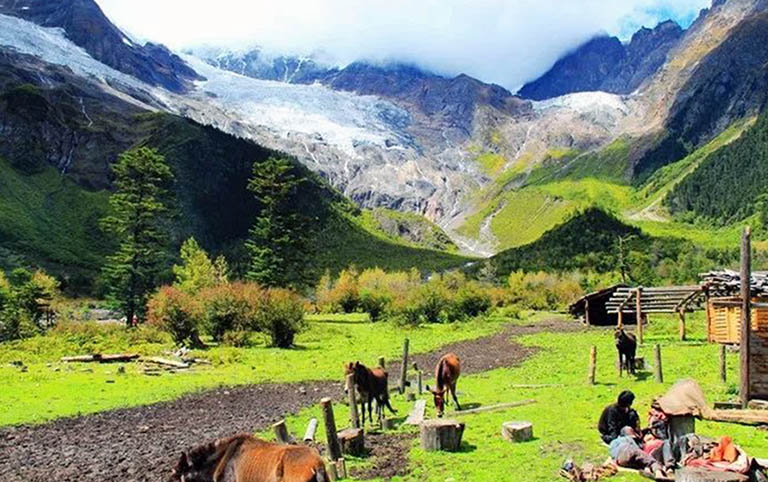 Xiaonong Base Camp
Xiaonong Base Camp
After breakfast, you can enjoy the beautiful sunrise with golden light illuminating the peaks. After that, enjoy your last full-day hiking journey to Sacred Waterfall (3,657 meters).
Compared with the hike to Ice Lake the previous day, today’s hiking is easier and shorter. The views at the start of the trek are immediately stunning - a ridge of brilliant and craggy snow-capped peaks standing against the azure sky. At the mouth of the valley and the end of the village, a Tibetan Buddhist temple basked in the glory of its surroundings. The way to the falls is never a problem, as huge strings of prayer flags are stretched from point to point along the valley floor and up its sides. When you reach the top, the Sacred Waterfall will take your breath away. This hiking lasts about 6 kilometers, taking about 1.5-2.5 hours for single way. It is said that Yubeng waterfalls are the holy water that God of Kawagebo gets from the heaven, which can tell the fate of people and eliminate disasters. Hence, numerous Tibetan pilgrims come to bathe in the waterfall to purify their spirits. Walk around the waterfalls for 3 circuits and spend some time gazing up before turning back to Lower Yubeng.
Stay overnight at Lower Yubeng Village.
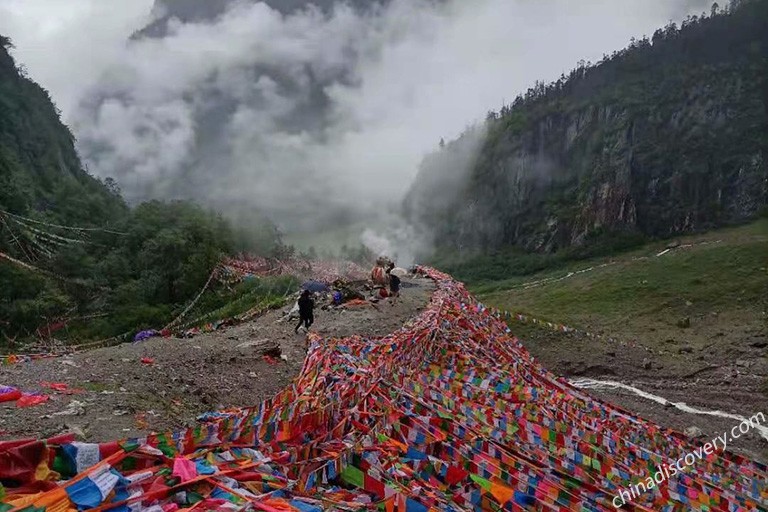 Sacred Waterfall
Sacred Waterfall
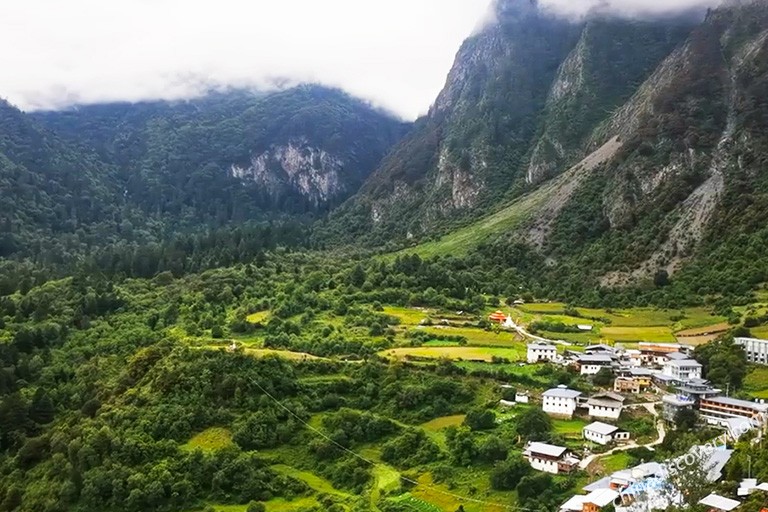 Lower Yubeng
Lower Yubeng
This will be the last day to hike out Yubeng Village and get back to Shangri-La. After breakfast this morning, you need to hike around 18 kilometers from Lower Yubeng Village to Ninong Bridge (2,060 meters), which takes about 4 hours. If weather is fine, it will be a very enjoyable journey to finish the hike. Altitude descends with Yubeng River and and scenery changes along the way. After arriving at Ninong Bridge, you’ll be picked up there and be transferred back to Shangri-La (about 5 hours).
After the tour, you will be escorted to the airport for your evening flight to next destination. Tour ends!
Departure Ideas: As you will arrive in Shangri-La around 17:00~18:00 in the late afternoon on the last day, we suggest you arrange a night flight departing after 20:00 at least. Besides, if you fail to arrange a suitable flight or want to have a better rest, you can tell your travel consultant to add one more day into your trip so that you can leave Shangri-La on the next day without any hurry!
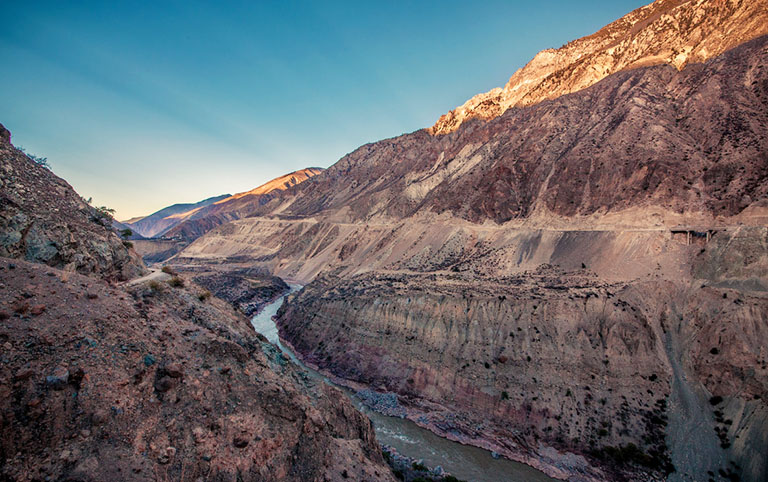 Ninong Grand Canyon
Ninong Grand Canyon
No documents found.
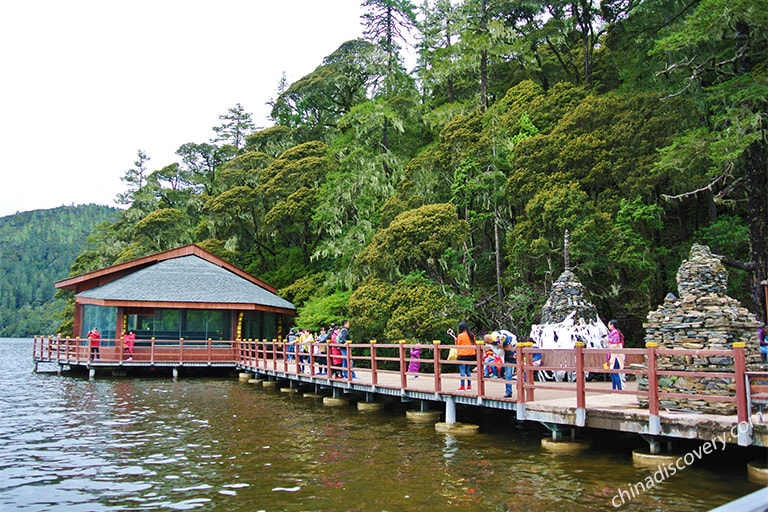
Lijiang / Shangri-La
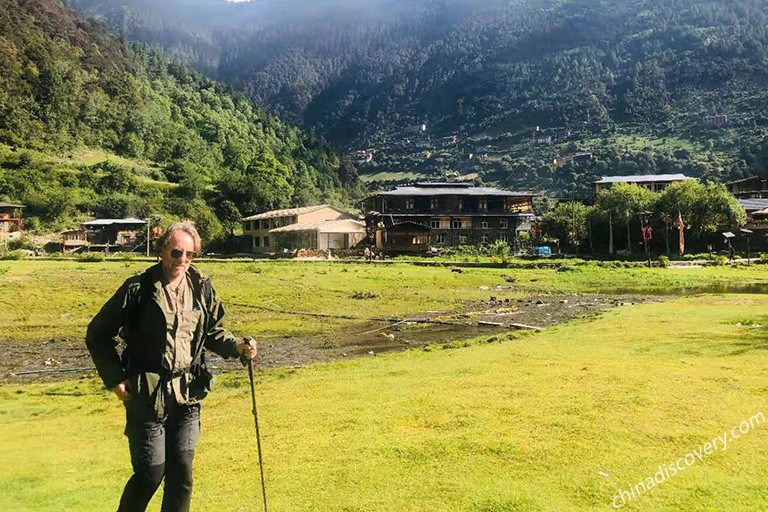
Shangri-La / Yubeng / Shangri-La
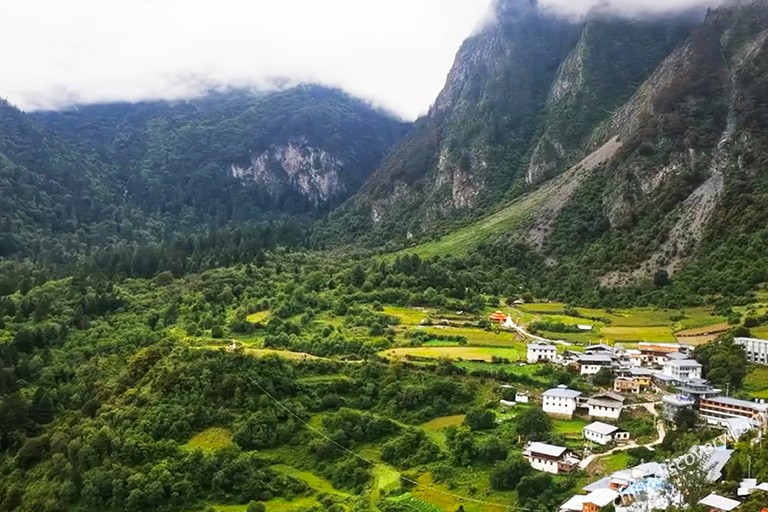
Shangri-La / Deqin / Yubeng / Shangri-La